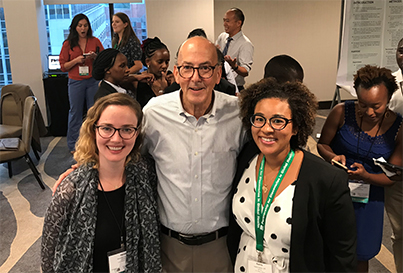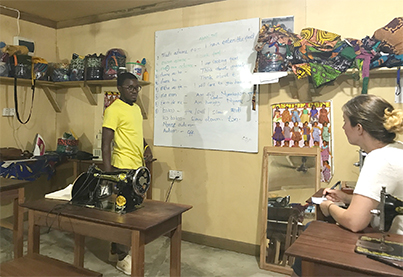Earlier this year, each garnered NIH funding from the Fogarty International Center to conduct 12-month in-country projects aimed at bolstering mental health services in Ghana. Even as Burns and Natala ramp up their research, the Fogarty Center is seeking applicants for the next round of fellowship funding. The application deadline is November 15.

“I would highly recommend that anyone who has an interest in global health research apply,” said Natala, MD. “It is a wonderful, structured opportunity to learn how to be a researcher while still getting an ample amount of support. I feel incredibly fortunate to be here.”
Both she and Burns are in Kumasi working with collaborators at Komfo Anokye Teaching Hospital (KATH). Natala’s work explores expanding screening and treatment services for children with developmental disabilities, while Burns’ research will focus on suicide.
Each completed their child psychology fellowships at UMMS this spring shortly before kicking off their Fogarty projects. The experience launched in Bethesda, MD this summer with a one-week orientation at the NIH headquarters before traveling in early August to Ghana.
“We have been on the ground in Ghana for about two months, and it has been an important time to learn from and listen to our collaborators to ensure our projects are meaningful and successful,” said Burns, MD. “Through this process, many of our colleagues in the KATH Psychiatry Department have become friends and have invited us into their homes.”
Since arriving in Kumasi, both have already finalized their project plans and obtained the required institutional approvals to move ahead with their respective projects. Burns is studying the rates and risk factors of suicide attempts in Ghana using both retrospective and prospective patient data analyses. Natala’s work involves taking stock of current care options for children with neurodevelopmental disabilities and surveying providers about their attitudes toward screening and caring for such patients.

“It has been humbling to learn how much work and planning goes into creating a protocol, designing surveys and interview guides, and getting ethical approval in a foreign country,” Natala said. “Our local mentor has been incredibly helpful. She has served as a cultural liaison and enabled us to navigate the process of approval here, facilitating numerous meetings with key local collaborators.”
The two women share an apartment in Kumasi, a city of nearly 2 million in central Ghana. Outside of their projects, they attend weekly language classes to become more fluent in Twi, the common local language.
“That has been a great way to engage with the people living here,” Natala said. “Through the lessons, we’ve met a community of younger professionals from around the world who are working in Ghana. That has been a fun experience and nice way to cope with being a foreigner in a new country and culture.”
Their projects, which will continues through mid-summer, are made possible through the Fogarty Center’s Northern Pacific Global Health Research Training Consortium, a partnership between the universities of Washington, Michigan, Hawaii, Minnesota, and Indiana. The schools leverage their collective institutional partnerships to connect the selected fellows – generally postdoctoral trainees – with collaborating mentors in low- to middle-income countries.
“One of the most exciting aspects of this experience is that it allows you to pause your fast-paced life and invest an entire year to learning a new skill,” said Burns. “Just seven months ago, I never would have imagined myself doing a research fellowship year, and to be honest I am still pinching myself that I get to live in a such a wonderful community and spend time nurturing a new skill.”

